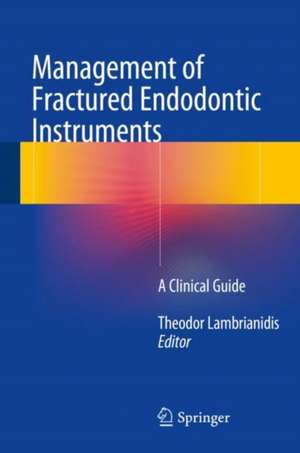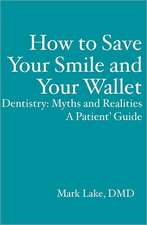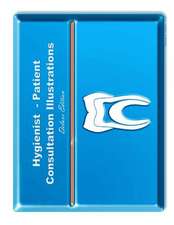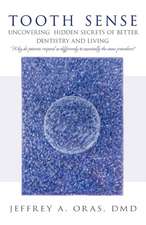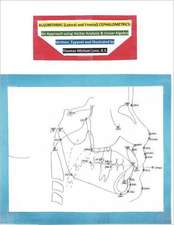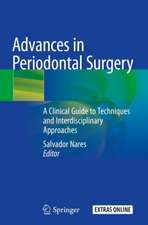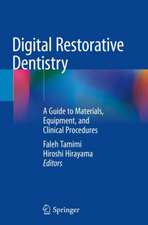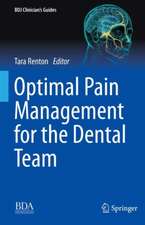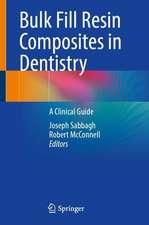Management of Fractured Endodontic Instruments: A Clinical Guide
Editat de Theodor Lambrianidisen Limba Engleză Hardback – 12 oct 2017
| Toate formatele și edițiile | Preț | Express |
|---|---|---|
| Paperback (1) | 771.17 lei 38-44 zile | |
| Springer International Publishing – 23 aug 2018 | 771.17 lei 38-44 zile | |
| Hardback (1) | 1292.30 lei 3-5 săpt. | |
| Springer International Publishing – 12 oct 2017 | 1292.30 lei 3-5 săpt. |
Preț: 1292.30 lei
Preț vechi: 1360.32 lei
-5% Nou
Puncte Express: 1938
Preț estimativ în valută:
247.36€ • 268.78$ • 207.92£
247.36€ • 268.78$ • 207.92£
Carte disponibilă
Livrare economică 31 martie-14 aprilie
Preluare comenzi: 021 569.72.76
Specificații
ISBN-13: 9783319606507
ISBN-10: 3319606506
Pagini: 283
Ilustrații: IX, 283 p. 165 illus., 90 illus. in color.
Dimensiuni: 155 x 235 x 21 mm
Greutate: 0.64 kg
Ediția:1st ed. 2018
Editura: Springer International Publishing
Colecția Springer
Locul publicării:Cham, Switzerland
ISBN-10: 3319606506
Pagini: 283
Ilustrații: IX, 283 p. 165 illus., 90 illus. in color.
Dimensiuni: 155 x 235 x 21 mm
Greutate: 0.64 kg
Ediția:1st ed. 2018
Editura: Springer International Publishing
Colecția Springer
Locul publicării:Cham, Switzerland
Cuprins
Introduction.- Causes of Intracanal Instrument Failure.- Factors Influencing Management of Separated Instruments.- Management Options of the Error.- Comparative Evaluation of Techniques Used.- Complications during Management of Separated Instruments.- Impact of Retained Fragment on Prognosis of Root Canal Treatment.- Prevention.
Notă biografică
Theodor Lambrianidis is Professor of Endodontics at the Dental School, Aristotle University of Thessaloniki (AUTH), Greece. He graduated from AUTH Dental School in 1976 and then completed postgraduate studies at the Oral Surgery Department, Queen Mary's Hospital, London and at King’s College Hospital Dental School, London, UK. He completed his PhD studies in 1981 at AUTH Dental School. Dr. Lambrianidis became an Assistant Professor at AUTH in 1993, an Associate Professor in 1999, and Full Professor in 2006. Since 1980 he has also held a private practice specializing exclusively in endodontics. He was elected vice – president and president of the Hellenic Endodontic Society. Professor Lambrianidis has served on the Editorial Board and review panels for numerous scientific and endodontic journals and was also appointed as Editor in chief of “Endodologia”, the official journal of the Hellenic Endodontic Society.
He is a regular lecturer in national and international congresses and meetings, and has published more than 100 papers in peer-reviewed journals, including 70 in international journals. He is also the sole author or co-author of five previous books in endodontics.
He is a regular lecturer in national and international congresses and meetings, and has published more than 100 papers in peer-reviewed journals, including 70 in international journals. He is also the sole author or co-author of five previous books in endodontics.
Textul de pe ultima copertă
This superbly illustrated book provides detailed information on the causes of instrument failure during endodontic treatment, the factors influencing the management of such cases, and the diverse management options that may be employed to resolve the problem. Readers will find clear descriptions and comparative evaluation of the available methods, techniques, and devices. Complications that may arise during the management of fractured instruments are described, and the impact of retained file fragments on the prognosis of endodontic treatment is discussed. In addition, means of preventing iatrogenic errors from occurring in the first place (the best form of management) are explained, emphasizing that the risk of instrument failure is reduced if proper guidelines are carefully considered and followed. The book will assist both endodontists and general dental practitioners in achieving an optimal outcome when confronted with the time-consuming and challenging task of dealing with a fractured instrument within the root canal – a still frequent circumstance despite the plethora of improvements in instrument design, alloy composition, and manufacturing processes.
Caracteristici
Describes and illustrates diverse techniques for dealing with instrument failure during endodontic treatment Identifies complications that may arise during the management of separated instruments Explains the prognostic impact of retained file fragments Emphasizes the importance of prevention Includes supplementary material: sn.pub/extras
